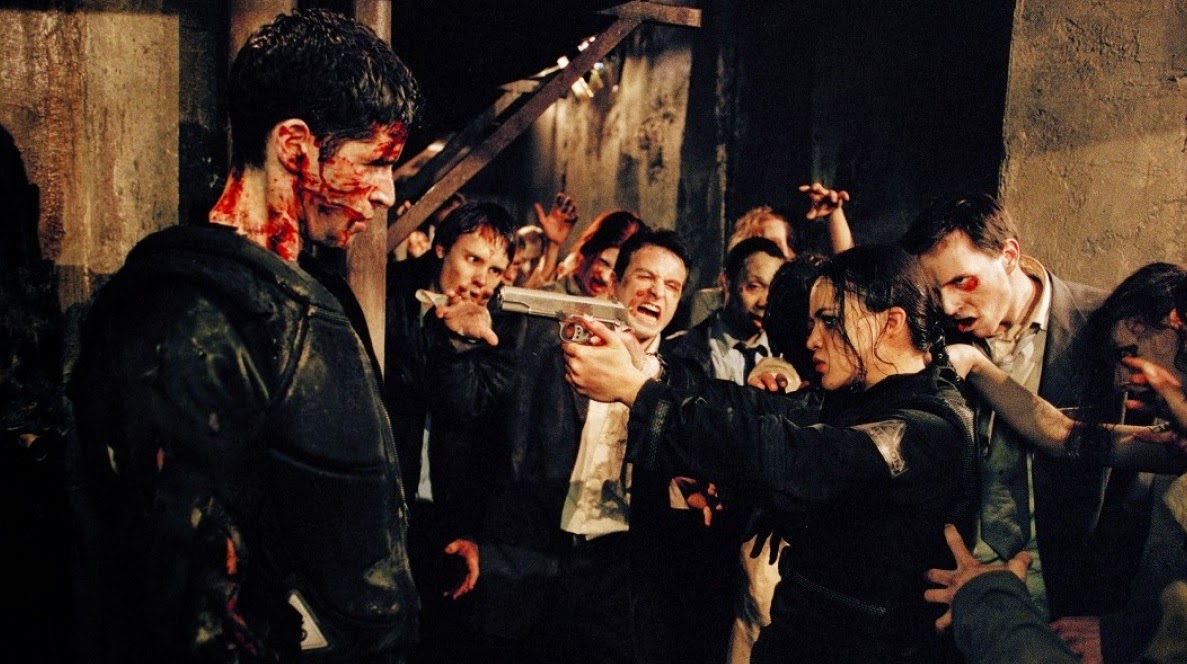Halloween Horror: Resident Evil (2002)
Despite what the vocal Paul W.S. Anderson enthusiasts on Twitter will tell you, his 2002 video game adaptation, Resident Evil, remains a terrible film. Like most video game adaptations, Anderson’s Resident Evil jettisons the very elements that made the video game special, while failing to supply anything novel as a replacement for the survival horror elements of the video game classic, aside from some slapdash homages to James Cameron’s Aliens and Paul Verhoeven’s Starship Troopers. In fact, apart from some fluid action filmmaking, Resident Evil is an empty collection of bad dialogue, cornball monsters, and ugly special effects. It does nothing to dispute the notion that video games make for bad movies.
The plot follows Alice (Milla Jovovich at her most stunning), who wakes up in a mysterious mansion without any memory of how she got there. Soon enough, she joins a special forces team and a ragtag group of stragglers to descend into a genetic research facility known as the Hive, which is located beneath the quiet mountain town of Raccoon City. An unknown thief has stolen the facility’s prize research project, the T-virus, and unleashed it on the facility’s workers, transforming the dead into zombies and sending its A.I. security system into lockdown. Alice and the team have to figure out who stole the virus, while also navigating the security protocols of the A.I. system, hoping to stop the virus’s spread to the city above.
If you’re familiar with the Resident Evil video game, you’ll know that the above plot description bears almost no resemblance to the “police squad investigates creepy mansion” narrative of the game. Of course, the plot still follows video game logic, with the main characters (including Alice, Michelle Rodriguez’s tomboy soldier, Rain, and James Purefoy’s fellow amnesiac, Spence) passing through levels of the facility to find specific keys necessary to unlock their path and facing off against increasingly-difficult enemies along the way. Part of this rigorous forward momentum is admirable—there’s a reason video games are addictive, as their narratives constantly thrust you forward—but there’s no weight to anything happening in Resident Evil. Characters get bogged down in convoluted discussions about their backstories and the sinister machinations of Umbrella Corporation, the shadowy organization behind the entire disaster, which only serve to break up shoddy horror sequences and chaotic action.
The thing is, for a film that’s ostensibly a horror film, nothing about Resident Evil is scary. The CGI monsters look too weightless and slick to be real, while the practical makeup transforms the ordinary zombies into something akin to D-list baddies from Buffy the Vampire Slayer. In fact, the entire underground facility is reminiscent of The Initiative from Buffy’s uneven fourth season, with endless rows of metal crates and stairways to nowhere attempting to add scale to the obviously-limited set. I wouldn’t be surprised if the filmmakers bought old Buffy sets from WB to reuse here.
Anderson fares better in the straight action scenes, as his relentlessly kinetic camera movements are never boring. There’s even one sequence where the special effects and his hyperactive camera work blend effectively, even if the scene is a blatant ripoff of the memorable opening to Vincenzo Natali’s Cube. But in most moments, Anderson’s visual style is weightless. You never get the chaotic adrenaline rush of a Michael Bay film nor the flowing grace of a Hong Kong gun-fu picture. Instead, you get a film where the flesh-and-blood characters seem as unreal as the now-dated CGI monsters stalking them and most action scenes are an undifferentiated combination of gunfire and bloodshed. There’s something to be said about such brazen disinterest in verisimilitude, but anyone making the point that Anderson is crafting an arch picture in service of some greater thematic interests (about corporate malfeasance, for instance, or the malleability of identity) is reaching for profundity where there is none.
Resident Evil is not the disaster that BloodRayne or House of the Dead are because Anderson is a more gifted director of action than Uwe Boll. But there’s no hidden gem here, nor any kind of justly-celebrated exercise of style over substance. Perhaps the later sequels are marked improvements (I haven’t seen them), but this video game adaptation deserves to put out on the curb along with broken PlayStation Ones and cracked Resident Evil game discs. It’s utterly forgettable.
3 out of 10
Resident Evil (2002, USA)
Directed by Paul W.S. Anderson; written by Paul W.S. Anderson, based on the video game by Capcom; starring Milla Jovovich, Michelle Rodriguez, Eric Mabius, James Purefoy, Martin Crewes, Colin Salmon.
